Music ignites all areas of child development and skills for school readiness, including intellectual, social-emotional, motor, language, and overall literacy. It helps the body and the mind work together. Exposing children to music during early development helps them learn the sounds and meanings of words.
Close relationships have a significant impact on children’s development and music can support these intimate relationships. For example, singing lullabies to babies is a great way to bond. Studies have found that babies will listen calmly to a lullaby for twice as long as baby talk or adult speech! When caregivers sing lullabies, changing their pitch, tone and lyrics to soothe and relax the baby, they will also feel a sense of security and care.
Babbling and sound-play helps babies develop the neural pathways needed to listen and speak. Did you know infants who hear language directed to them tend to babble more and gain larger vocabularies by toddlerhood? Children can easily and quickly mimic music and sounds they hear as a way to understand and make sense of the world around them.
Music has the ability to foster community and belonging. In their homes, children feel connected to their families and communities as they hear accents, songs and stories. In the US, one in four children has at least one immigrant parent. Because of this, preschool tends to unify home and education together. During preschool, young children must learn about and experience the concepts of ‘belonging’ and ‘being an outsider’. When teachers incorporate the music and sounds of several cultures, the children can experience an inclusive and connected world early on.
Live music is exciting for us adults, but it’s even more exciting for little ones! Live music is known for creating happiness and excitement in those experiencing it. Music can even protect us from illness, according to Carnegie Hall. Cooking familiar foods, celebrating holidays, and performing beloved music and dances are ways for children to discover the possibilities of laughing and joking, and to experience positive emotions like delight, joy, and affection.

